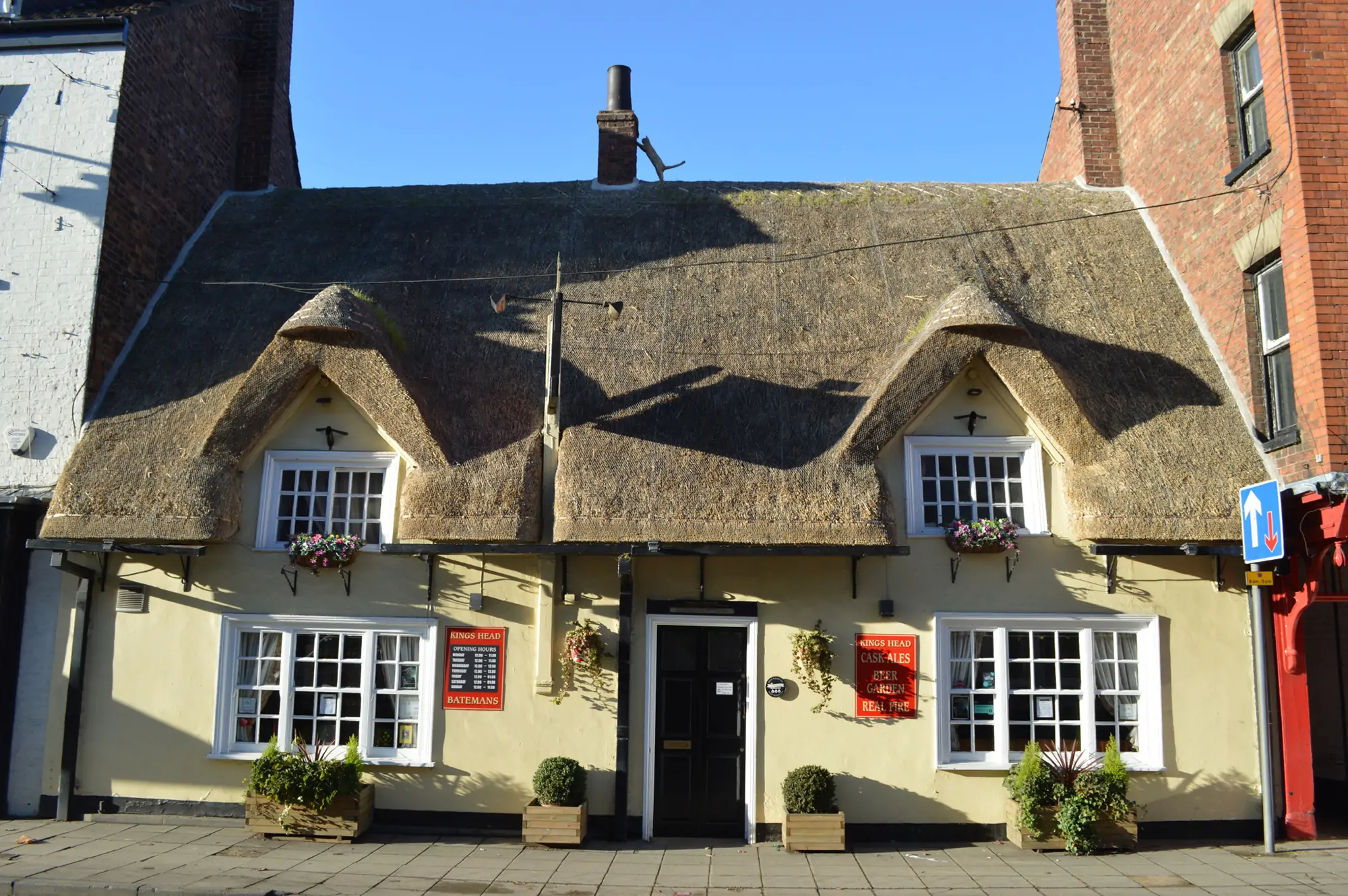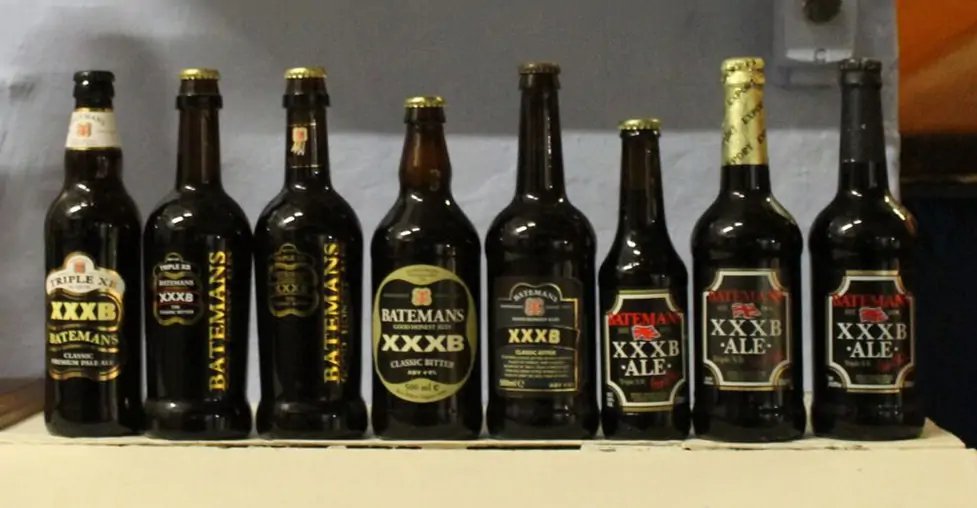All the support from employees, tenants and well wishers really helped us to stay strong.
George G Bateman – Managing Director, third generation
I joined my father in the business in 1950 as Executive Director. I was in charge of the commercial side of the Brewery. After National Service, I trained as a brewer at Green’s Brewery in Luton and Kelseys of Tunbridge Wells – neither around today.
There were opportunities to work elsewhere, but my roots were steadfastly embedded in Wainfleet and the family tradition and values, that I returned home to the family business.
QUALITY COMES FIRST
As far back as 1953, fermentation took place in the same casks used to ship beer out into the trade. The barrels were stacked on pine troughs, allowing the fermenting beer to flow out of the bunghole and down the belly of the casks. The casks were then topped up again every two hours using beer from the troughs.
These casks were stored in a downstairs area where, despite an annual coat of whitewash, the temperature could reach 25 degrees in the summer. These temperatures weren’t suitable for the quality of the beer, so we needed a more sophisticated temperature control system. We invested a lot of money in stainless steel fermenting vessels with an internal temperature control mechanism, refinements and additions – the basis of our setup today.
Quality has always come first, so we did everything possible to reduce the chance of yeast infections in the beer. At one point, I arranged for several fruit trees surrounding the brewery to be taken down (fruit being a potential carrier of such infections) – much to my father’s horror!
A GROWING ESTATE
As well as brewing ‘Good Honest Ales’, my family had built up an estate of 70 pubs by 1957. Around this time, we had the opportunity to buy 29 more establishments in and around Boston for the princely sum of £50,000.
Before the Second World War, ‘vertical drinking’ was considered one of the deadlier sins, so most of the pubs we bought didn’t come with bar counters. There was plenty of seating, in any case. Also, historically, the law had prevented pubs with fewer than two rooms from having full licences. So, for the next eight years, I was in and out of court arranging full licences and upgrading our new pubs with the bars we recognise today.
As we moved into the seventies, brewers wanted to make the production process less risky and cheaper. So, they created a trend towards keg beer. Our traditional cask-conditioned ale lost popularity, and we had to build a “Heath Robinson” keg washer and filler. But we couldn’t afford a full-blown modern keg line.
Drastic measures
The decline in cask ale’s popularity was so drastic that many of our pubs were being fitted with quarter-pint pumps in place of the half-pint beer engines. The prospects for Batemans looked grim.
Then a knight in shining armour rode in. The Campaign for Real Ale (CAMRA) began to reawaken people’s enthusiasm for beer with more flavour and varied character. So once again the foaming head on a Batemans ale was in demand. In so much demand, in fact, that we began to venture beyond our home county.
The first time our beer was stocked outside Lincolnshire was in 1976, when a new, CAMRA-invested pub in Cambridge started serving our XB bitter. I proudly went to the opening with my wife Pat and daughter told them, “This isn’t our beer”. After they insisted it was, I popped down to the cellar to check and, lo and behold, they had connected the piping to a Sam Smiths barrel! They didn’t make the same mistake twice.
While dealing with so much change, I had been supported constantly by Pat. We had met while on holiday in Italy some years earlier. Because she lived in Surrey, we only really saw each other at the weekends. Often this involved us having lunch together in Kingston on Sundays. Afterwards, I would drive back to Wainfleet and arrive home at about midnight. Keen as ever, I would go straight into the Brewery to brew.
That courtship was a testament to our efforts in juggling family life with a busy beer and pub business. Challenging but rewarding, I would say. Thankfully, helping hands were on their way.
My daughter Jaclyn joined the team in 1984. She’d been travelling the world following her nursing training at Cambridge, but felt a strong pull toward the family business. We were delighted to have her on-board.
My son Stuart, who was poised to join a few years later, had just started a three-year brewing and business foundation course with Mansfield Brewery, after studying business at St Paul’s in Cheltenham. He too was ready and raring to get stuck in.
A flourishing family concern, you would think. But in 1985 I had to face the hardest challenge of my life. My motto “death or glory” was to be put to the test over the next two years.
Simmering tensions
You see, the shares in the Brewery were divided between my brother, my sister and me. Naturally, my father thought this was the fairest way of passing down the legacy. But for a while, a spot of family tension had been simmering over the future of the business.
Then in March 1985, it well and truly boiled over. My brother John and sister Helen announced that they wanted to sell up. Pat, Jaclyn, Stuart and I were all devastated. I had to get my thinking cap on quickly, as I knew it wouldn’t be long before rumours started to spread.
Although we delayed any announcement for a while, the presence of merchant bankers and hordes of prospective buyers soon meant that I had no choice but to tell the staff and tenants, followed by the press, about what was happening.
I still can’t believe the support that followed from so many well-wishers. One day, a local farmer knocked on my door and said he had £3,000 to invest if it would help. On another occasion, two daughters of one of our tenants asked if they could put a bottle on the bar to collect money for the Brewery. All the support we were shown by employees, tenants and well-wishers really did help us to stay strong.
The only solution, though, seemed to be an outright purchase of the Brewery. To my family I became known as “Mr Ah, but…”. I would go to bed at night deciding there was no way I could raise all the money needed. Having never been the best of sleepers, I would lie awake trying to work out a way of sorting things out.
In the morning, after telling Pat the night before I could see no way out, my first words were, “Ah, but I have had another idea…”. And off to the city I would go with my battered briefcase and my latest proposal.
Changing tide
In August 1986 the tide suddenly changed. Our premium ale Triple XB was hailed CAMRA Beer of the Year at the Great British Beer Festival. Demand for our beers grew dramatically. Then with the help of a London solicitor, who had heard Pat and me telling our story on the radio, we were able to raise enough money to buy out my brother and sister.
On 3 February 1987, I must have been the happiest man alive as I issued this statement: “We are pleased to announce that the long-standing differences between the shareholders, as to the future of the company, have been resolved.” Several serious parties followed.
Our prospects were certainly looking up, but the battle wasn’t over. Although we had secured our independence, it was on the back of significant borrowings from the bank. So we were in a tight spot, and we needed to pay for the upkeep of the Brewery and pubs.
Batemans has continued to go from strength to strength. Our cask beers are served in pubs throughout the UK, while our bottled beers are stocked in most major supermarkets.
Firstly, we decided to quickly sell off some pubs – to the right buyers, it goes without saying, because we didn’t want to leave a village without its pub. So Stuart set about taking care of that while also reorganising the tenanted trade arm and developing a free-trade wholesale division (allowing us to sell our beer to independent pub owners).
It turned out to be an advantageous time to sell a few pubs. The property boom of the late 80s and early 90s was just taking hold, which meant that many prospective pub buyers, having sold their properties down south for extortionate sums, were now looking for rich pickings up north. At one auction, a pub selling only 45 barrels a year was on offer at £35,000. It ended up selling for £165,000.
Shortly after the pub sales, we were able to focus on growing parts of the business that needed less investment. After winning Champion Beer of Britain in 1986, Triple XB was in high demand so we needed to expand our beer distribution outside Lincolnshire – and fast. Jaclyn was on it. She had already started setting up a network of wholesalers and export agents, which eventually resulted in Batemans being available nationally and our bottled beers internationally.
Going strong
It wasn’t long before we could turn our attention to pubs again. Following a major restructure in 1998, we were able to extend beyond Lincolnshire and open new pubs in Norfolk, Cambridgeshire, Nottinghamshire, Derbyshire, Leicestershire and Yorkshire.
With a new millennium on the horizon, and Jaclyn and Stuart firmly at the helm, it was about time for me to pass on the reins to the next generation. I was honoured to receive the Lifetime Achievement award from the All Parliamentary Beer Group, as well as an accolade from the Guild of British Beer Writers.
Meanwhile, Batemans continues to go from strength to strength. Our cask beers are served in pubs throughout the UK, and our bottled beers are stocked in most major supermarkets. As sales have grown, we’ve never compromised on quality. That approach has earned our beers and our pub business many top awards and, above all, loyalty for which I’ll always be grateful.
Now I really get what my father meant when he commented on how the future might unfold for our family brewery. “There have been good times and bad times in the past and there will be again,” he said. “But if you put your back into it and work hard, you will do well. If you just want to sit back and take money out of the business, you will not succeed.”
On 7 March 2005, George’s wife Pat passed away. Two years later, on 25 June 2007, George – Bateman’s Chairman at the time – also passed away. Today, directors Jaclyn and Stuart are proud to be continuing their parents’ hard work and the legacy of Batemans as a fourth-generation family brewery.

